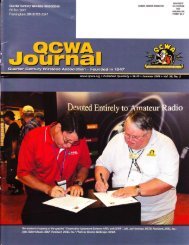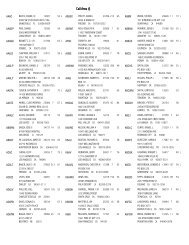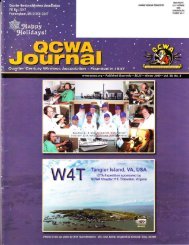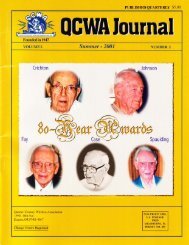Create successful ePaper yourself
Turn your PDF publications into a flip-book with our unique Google optimized e-Paper software.
PLEASE CLARIFY<br />
A. Section 97.7 says, when transmitting, each amateur<br />
station must have a control operator. The control operator<br />
must be a person for whom an amateur operator/primary<br />
station license grant appears on the ULS consolidated<br />
licensee database, or who is authorized for alien reciprocal<br />
operation. Section 97 .105 says that a station may only be<br />
operated in the manner and to the extent permitted by<br />
the privileges authorized for the class of operator license<br />
held by the control operator.<br />
Your view is that your next door neighbor (who apparently<br />
is not a ham) is "operatrng" but not "being the control<br />
operator of your station" when you let him communicate<br />
via your station. Stick with the term "control operator"<br />
as defined rn Section 97.3(a)(13): the control operator<br />
is an amateur operator designated by the licensee of a station<br />
to be responsible for the transmissions from that station<br />
to assure compliance with the FCC Rules.<br />
Before your station transmits on an amateur service<br />
band, the station licensee (you) has to decide just who will<br />
be its control operator (you or your neighbor.) Unless your<br />
neighbor holds an amateur operator license grant, he cannot<br />
be the control operator of any FCC-licensed amateur<br />
stati o n .<br />
A. Section 97.105(a) says that the control operator must<br />
ensure the immediate proper operation of the station,<br />
regardless of the type of control.<br />
W3BE-O-GRAM: My BE lnformed No. 1 W3BE CHECK-<br />
LISTS goes into detail about the duties of the control<br />
operator and those of the station licensee. lt is availa<br />
bl e free from http: l lw3be. home.att. neil.<br />
A. Think again. Unless there is no other option for summoning<br />
help when in legitimate distress, there is never an<br />
occasion that any person can be the control operator of a<br />
station transmitting outside the frequency bands authorized<br />
in Section 97 .301 for the class of operator license<br />
held.<br />
When a person is participating in stating the message as<br />
a third party under the authonty of Section 97"115(b), the<br />
fact that the person may hold an amateur operator license<br />
grant is beside the point No third-party - even one that<br />
holds an amateur operator license - can be the control<br />
operator of an amateur station.<br />
Note, moreover, Section 9l .115(b)(2) says the third party<br />
must not be a prior amateur service licensee whose license<br />
was revoked; suspended for less than the balance of the<br />
license term and the suspension is still in effect; suspended<br />
for the balance of the Iicense term and re-licensinq has not<br />
taken place; or surrendered for cancellation following<br />
notice of revocation, suspension or monetary forfeiture<br />
proceedings. The third party may not be the subject of a<br />
cease and desist order which relates to amateur service<br />
operation and which is still in effect.<br />
The rules, therefore, make a clear distinction between<br />
the control operator of an amateur station and a third<br />
party who is merely participating in stating a third party<br />
message during a transmission.<br />
A. Section 9l .3(a)(14) says the control point is the location<br />
at which the control operator function is performed.<br />
W3BE-O-GRAM: The word "point" usually refers to a<br />
narrowly localized place having a precisely indicated<br />
12 QCWAJournal e Winter 2OO7 . w\^wqcwaorg



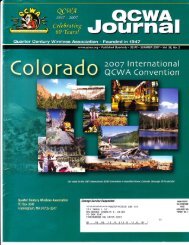
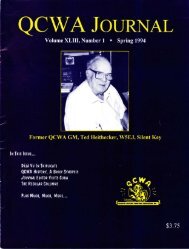
![11{J hI EfifSIt]E I]E - Quarter Century Wireless Association](https://img.yumpu.com/11816560/1/190x245/11j-hi-efifsite-ie-quarter-century-wireless-association.jpg?quality=85)
